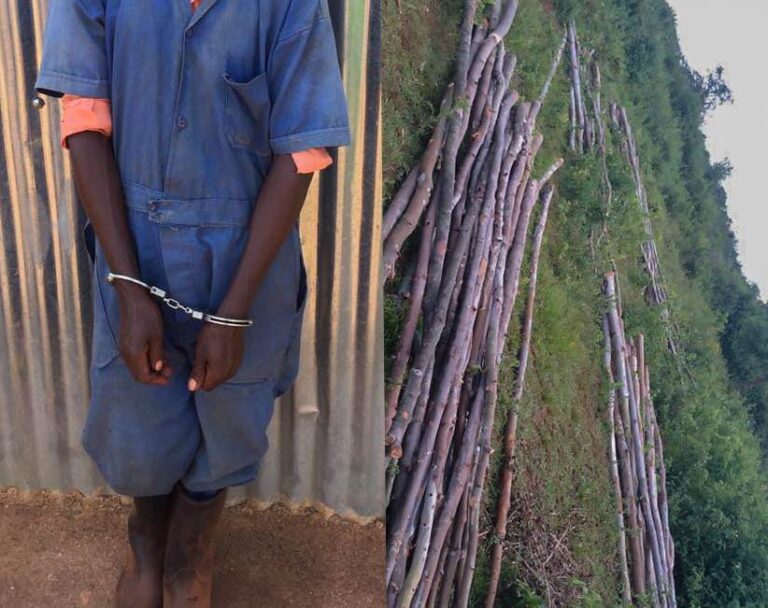
Over the past week, Rwanda National Police (RNP) has conducted separate operations against unlawful activities that destroy the ecosystem.
A number of people have also been arrested in these environmental degradation activities.
On Sunday, December 24, a 40-year old man was apprehended in Kayonza District for allegedly destroying part of a gazetted forest located in Sabasengo in Kageyo Cell, Mwiri Sector.
At the time, he was found with 174 trees, which he cut from the same protected forest.
On Christmas Day, at about 9a.m, Police intercepted a woman in Rutsiro District, who was at the time trafficking 30,000 pieces of non-biodegradable polythene bags.
The outlawed plastic bags packed in 150 cartons, were being transported in a passenger service vehicle. The woman, one of the suspected dealers in the banned polythene bags, was headed to Karongi District to supply her clients.
Similarly, three men were also apprehended on Tuesday, December 26, in Rutsiro District, where they were conducting illegal mining activities.
Such illegal mining activities are also dangerous to those involved and in some cases, they have ended fatally as a result of lack of knowledge and skills, when conducted at night, and in dangerous concessions.
Cutting trees especially in protected forests, illegal mining and trafficking, sell or use of plastic bags are some of the activities that undermine the national environment policy.
What the law says
Article 44 of Law No.48/2018 of 13/08/2018 on environment prohibits the following acts in order to protect biodiversity: burning forests, national parks and reserved areas, burning swamps, grazing land, bushes, grass with the aim of agriculture or organising grazing land, killing, injuring and capturing animals of endangered species, destroying or damaging habitats, larvae, pupae or the young animals of the endangered species, causing death or burning protected plants, harvesting or destroying them, transporting or selling the remains of a whole or part of an animal and plants of endangered species, and cutting trees in forests or protected areas or in national parks.
In article 59; any person who causes death, destroys protected plants, harvests or damages them, commits an offence. Upon conviction, he/she is liable to imprisonment for a term of not less than three years and not more than five years and a fine of not less than Frw1 million and not more than Frw3 million.
Manufacturing, use, importation or sale of plastic carry bags and single-use plastic items are prohibited under article 3 of law N° 17/2019 of 10/08/2019 relating to the prohibition of manufacturing, importation, use, and sale of plastic carry bags and single-use plastic items in Rwanda.
In article 10, any person, who imports plastic carry bags and single-use plastic items is liable to the dispossession of those plastic carry bags and such items, and to an administrative fine equivalent to ten times the value of those plastic carry bags and single-use plastic items.
In article 11, a wholesaler of plastic carry bags and single use plastic items is liable to an administrative fine of Frw700, 000 and dispossession of those plastic carry bags and such items.
In article 12, a retailer of plastic carry bags and single-use plastic items is liable to an administrative fine of Frw300,000 and dispossession of those plastic carry bags and such items.
Anyone convicted for illegal mining or illegal mineral trade faces an imprisonment for a term of between two and six months and a fine of not less than Frw1 million and not more than Frw5 million or only one of these penalties.
The court also orders confiscation of any seized minerals or quarry in storage, trading or processing without a license.
Impact of community policing
Many people have been apprehended over similar environmental crimes, which have far reaching effects on the ecosystem.
These successful operations to protect the environment are largely attributed to the ownership of the public working with the Police and local leaders to implement the national environmental protection programmes to ensure that those involved in environmental degradation activities are arrested.
The public is further urged to keep sharing information on people, who violate policies and the law, to engage in such environmental crimes. (End)
